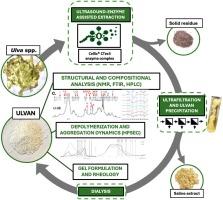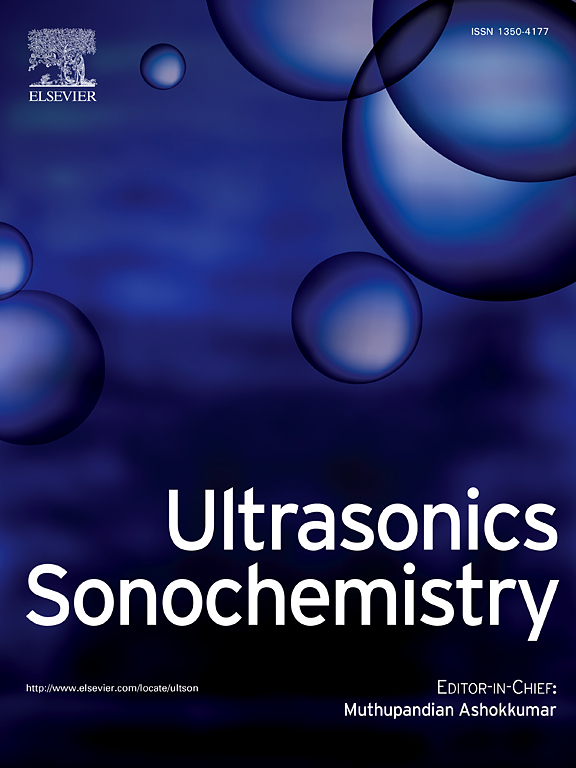通过新型超声波酶辅助法提取的溃疡素的特性、超滤、解聚和凝胶配方。
IF 8.7
1区 化学
Q1 ACOUSTICS
引用次数: 0
摘要
海莴苣(即莼菜属)在全球藻类生物量中占主导地位,对 "绿潮 "做出了重要贡献,是一种可持续的生物材料来源。本研究探索了一种创新的超声波酶辅助萃取方法,首次将新型 Cellic® CTEC3 鸡尾酒酶应用于莼菜,成功提高了莼菜的释放和萃取效率。为了获得更高的莼菜纯度,我们采用了多种处理方法,包括超滤和透析。透析莼菜可获得纯度更高的产品,碳水化合物含量高达 55.34%,硫酸盐含量高达 21%,且无葡萄糖污染。液体提取物通过超滤进行分馏,截留分子量为 3 kDa 的溃凡沉淀为 93.51%,占可提取溃凡总量的 50.28%。连续超滤浓缩了乌尔凡,但只部分改变了其分子量分布。使用微波和 H2O2 进行解聚使 ulvan 转向低分子量,减少了高分子量残留物。高纯度聚合酶链反应(HPSEC)证实了溃疡素的聚集行为与 pH 值有关,所有分离出的溃疡素分子量都超过了 786 kDa。对水解方法进行了比较,121 °C下2小时的1 M TFA水解提供了最佳的ulvan单糖图谱。傅立叶变换红外光谱(FTIR)和核磁共振(NMR)分析表明,硫酸化保留了下来。流变学显示了生物聚合行为和稳定的凝胶形成。乌尔凡具有营养保健潜力,适用于低Na+和高K+饮食,Na+:K+比率低至0.14,并且富含Mg2+。本文章由计算机程序翻译,如有差异,请以英文原文为准。

Characterization, ultrafiltration, depolymerization and gel formulation of ulvans extracted via a novel ultrasound-enzyme assisted method
Sea lettuce, or Ulva spp., dominates global algal biomass and significantly contributes to “green tides.”, representing a sustainable source for biomaterials. This study explores an innovative ultrasound-enzyme assisted extraction method with the novel Cellic® CTEC3 enzyme cocktail, applied for the first time in Ulva spp. succesfully enhancing ulvan release and extraction efficiency. Various processing methods, including ultrafiltration and dialysis, were employed to achieve higher ulvan purity. Dialyzation of ulvan resulted in a more purified product with a carbohydrate content up to 55.34 %, a sulfate content up to 21 %, and no glucose contamination. Liquid extracts were fractionated through ultrafiltration, with a 3 kDa MWCO yielding 93.51 % ulvan precipitate, representing 50.28 % of the total extractable ulvan. Sequential ultrafiltration concentrated ulvans but only partially modified their molecular weight distribution. Depolymerization using microwave and H2O2 shifted ulvans towards lower molecular weights, reducing high molecular weight residue. HPSEC confirmed pH-dependent aggregation behavior, with all isolated ulvans having molecular weights above 786 kDa. Hydrolysis methods were compared, with 2-hour 1 M TFA hydrolysis at 121 °C providing the best monosaccharide profile of ulvan. FTIR and NMR analyses showed preservation of sulfation. Rheology indicated biopolymeric behavior and stable gel formation. Ulvans demonstrated nutraceutical potential, being suitable for a low Na+ and high K+ diet, with a Na+:K+ ratio as low as 0.14, and were rich in Mg2+.
求助全文
通过发布文献求助,成功后即可免费获取论文全文。
去求助
来源期刊

Ultrasonics Sonochemistry
化学-化学综合
CiteScore
15.80
自引率
11.90%
发文量
361
审稿时长
59 days
期刊介绍:
Ultrasonics Sonochemistry stands as a premier international journal dedicated to the publication of high-quality research articles primarily focusing on chemical reactions and reactors induced by ultrasonic waves, known as sonochemistry. Beyond chemical reactions, the journal also welcomes contributions related to cavitation-induced events and processing, including sonoluminescence, and the transformation of materials on chemical, physical, and biological levels.
Since its inception in 1994, Ultrasonics Sonochemistry has consistently maintained a top ranking in the "Acoustics" category, reflecting its esteemed reputation in the field. The journal publishes exceptional papers covering various areas of ultrasonics and sonochemistry. Its contributions are highly regarded by both academia and industry stakeholders, demonstrating its relevance and impact in advancing research and innovation.
 求助内容:
求助内容: 应助结果提醒方式:
应助结果提醒方式:


